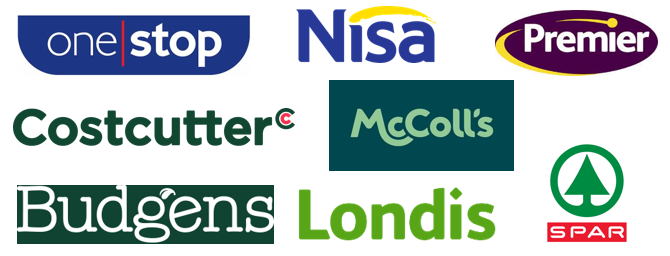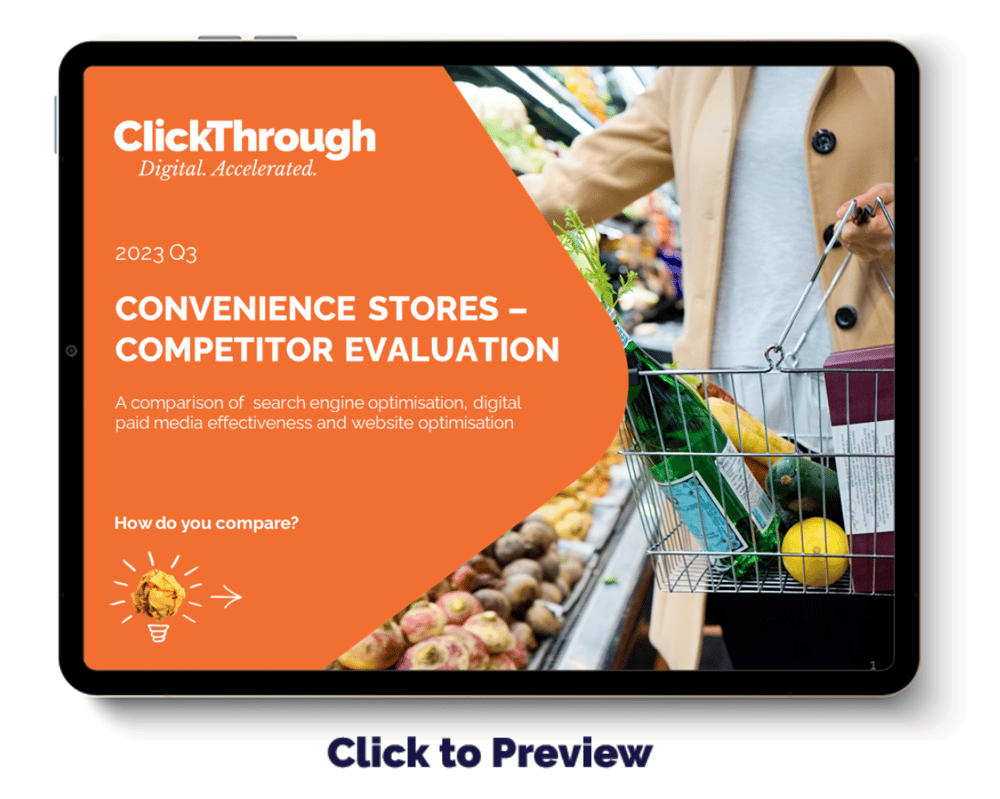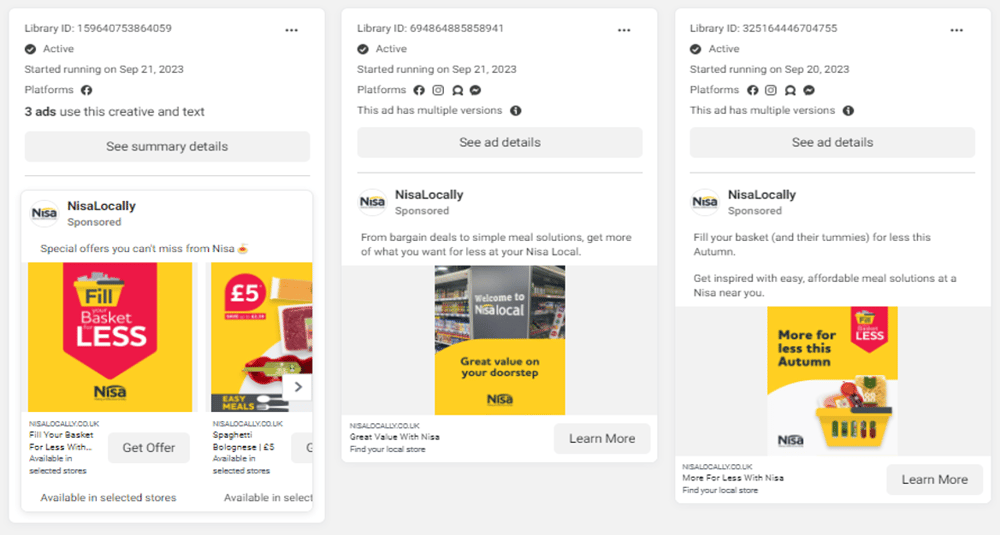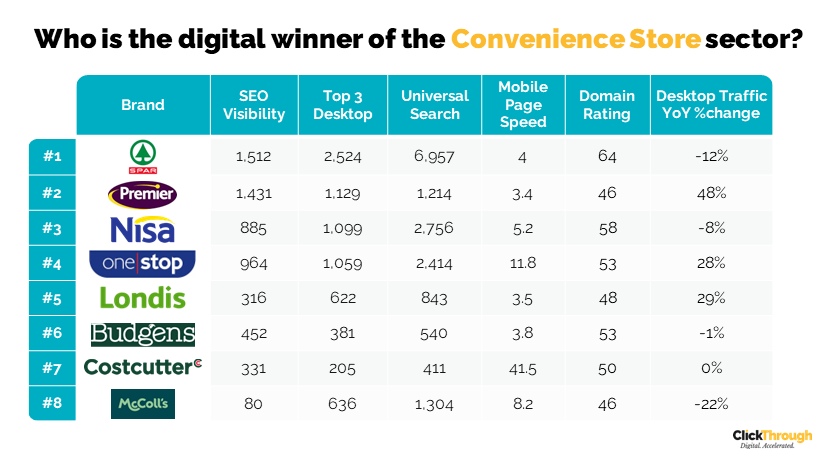The Q3 2023 benchmarking report for UK convenience stores has just been published. Learn how the top 8 UK convenience stores perform across the digital space.
The Q3 2023 benchmarking report for UK convenience stores has just been published. It covers the largest 8 national convenience stores, including Premier, Spar, Budgens, One Stop, Nisa, McColl’s, Londis, and Costcutter - it highlights year-on-year digital performance, plus winner and loser comparisons in 20+ online performance metrics.

The research gives an inside track on who is winning the biggest share of voice online and quantifies the gaps, risks and missed opportunities for other convenience stores to win brand exposure locally, increase in-store footfall, and drive traffic online. The report highlights quick wins that will improve enquiries from your online strategy and identifies the barriers that may be reducing your site’s ability to optimise digital performance.
To see a preview and contents page of the Q3 report, click here. To get a copy of the full report and the key takeaways, please complete the enquiry form or schedule a call.
What The Industry Research Report Covers
The 70+ pages of research benchmarks each brand based on 50+ metrics and indicators of successful digital strategy, including organic visibility, domain authority, paid media ads, conversion performance, technical performance, site speed, universal search, content, social ads, accessibility, and mobile performance.
Driving Optimal ROAS from Paid Media Channels
Some of the leading players in the space are high spenders on paid media channels such as Google, Bing & Facebook - but have a poor or sub-optimal conversion improvement strategy. Without an optimised, sophisticated conversion strategy that maximises the conversion rate, the return on investment is unsustainable or will under-perform. Scaling spend on paid media is not achievable unless the conversion rate delivers optimal performance in the sector. Some in the space have paid media spend levels from 30k+ per month but dedicate minimal resources and budgets to conversion testing. Given the cost per clicks on ad networks will continue to rise, we recommend spending at least 10% of your paid media budget on ongoing conversion optimisation testing schedules to ensure your paid media ROI maintains long term viability, competitive advantage, and sustainability.
Technical Website Compliance
Savvy digital marketers know that having a technically sound website is an essential component of a successful fully integrated digital strategy - plus a site capable of maximising conversion performance. For convenience stores, they'll want to take particular care that key pages, such as store locators, are clearly sign-posted.
In our last two reports, we found very few technical errors in any of the eight convenience stores sites. In Q3, the most significant result came from Nisa, which returned 66 4xx errors in our crawls. Though this figure is not too great a cause for concern, Nisa have still recorded a higher figure than all competitors, and must ensure no key pages are being blocked by digital dead ends.
Site Speed & Conversion Rate Performance
When 62% of consumers are less likely to convert if they have a negative mobile site experience, ensuring that your site is quick and easy to load makes a significant improvement on your overall conversion rates. Convenience store customers will often be visiting sites on the go, looking for nearby branches that they can immediately visit. Therefore an optimal mobile page experience is essential for giving a good impression of the brand.
We have seen falls in mobile page speed scores across all sectors we specialise in. In our last report for convenience stores, McColl's had seen its mobile page speed fall from 90 in Q1, to 38 in Q2. In Q3, McColl's has seen this score slightly improve again, hitting 44 - the second fastest convenience store site overall. Premier is achieving the lowest mobile page speed score, hitting only 13 points.
Building Competitive Advantage with Domain Authority
Domain authority is an essential metric for measuring the effectiveness of SEO performance, and helps create a reliable overall gauge of how effective your site is at achieving organic traffic, ie. ‘free’ traffic that isn’t gained through sponsored ads. With a range of products on offer, convenience stores should be able to create digital PR campaigns spanning multiple content themes, giving them a range of opportunities to build authority.
Domain authority is considered average between 40 and 50, good between 50 and 60, and excellent above 60. ‘Good’ DA score depends on the competition level of the industry. We've seen very little change in DA scores throughout our reports on convenience stores, with Spar recording the top score of 64 and McColl's scoring the lowest score of 45. Though 45 is a respectable score, McColl's should review its digital PR strategy to push itself into the 'good' score bracket, and catch up with competitors.
Organic Performance – Mobile & Desktop
A strong organic performance is strategically important as it ensures your site ranks above competitors for key, transactional keywords. When 93% of your customers won’t go past the first page of Google, your absence or lack of targeting for essential keywords will cost you conversions. Due to the cost-of-living crisis, we're seeing that many potential customers across a number of sectors are either cutting back on expendable items, or opting for cheaper alternatives. Convenience stores may be feeling the impact of this, as their potential customers may be taking greater care to do larger shops at cheaper supermarkets, as opposed to picking up items as needed.
Only two convenience stores have seen an increase in traffic year on year, with One Stop growing their digital footfall by 16% year on year. McColl's and Nisa are now seeing the biggest falls in organic traffic, with a 34% drop for McColls and 31% drop for Nisa.
Universal Search Opportunity
Google Universal Search Results is an evolving opportunity to make your pages visible on a SERP (Search Engine Results Page). Universal results often appear before traditional listings and are eye-catching for users. Universal search results refer to rankings on a SERP that are not the traditional ‘blue line’ Google link, and a brand can appear for universal search results without being strong in standard rankings. For convenience stores, they'll want to ensure they're appearing for 'Local Pack' results, ensuring they are prominent when potential customers are looking for a nearby shop.
Spar remain ahead regarding Universal Search results, and have made 1,200 'Local Pack' appearances (good news for securing local customers!). One Stop has been showing gradual improvement in 'People Also Ask' results throughout our four reports, growing from 165, to 322, to 405, and finally 630 results in our latest review. 'People Also Ask' results are an opportunity to appear for recipe or product-specific questions, and is an important result to remain strong in, to avoid losing ground to competitors.
The Longtail Keyword Opportunity
Longtail keywords are often considered high intent and potentially more likely to convert as a searcher is being more specific. Optimising for longtail keywords also puts your content strategy in a strong position to rank for brand-new search terms as they enter Google’s index. For convenience stores, long-tail keywords could be focused on specific products that potential customers are looking for, and a strong performance here could see quick visits from local customers needing a last-minute ingredient or essential item.
Costcutter has improved on their longtail keyword performance further, now ranking in the top three positions for 80 longtail keywords (compared to none at all when we first started reporting on the convenience store sector). This incremental change points to ongoing, positive steps being made by the Costcutter team, becoming more able to compete with other convenience stores for these high-conversion intent keywords.
Facebook Adverts
With the number of Facebook users in the United Kingdom (UK) forecast to hit over 42 million users by 2022, it is not surprising that companies have jumped at the opportunity to advertise on the social media platform. Facebook’s UK digital advertising revenue has been estimated to have breached 2.6b GB pounds in 2019. For convenience stores, they can use Facebook adverts to drive awareness of deals or sales events, or use local targeting to improve brand awareness in areas that footfall is low.
We've included examples of Nisa's recent Facebook ads below. Nisa has used consistent branding across all creative, that unifies their brand identity while also providing variety that wards off 'ad-blindness'.

Top Social Shares & Content
When it comes to social media and on-site content strategies, it is important to release content that has a longer shelf life. An article is considered 'Evergreen' if it has maintained its relevancy to an audience for longer. It's great for your brand engagement, but great for Google too, who will recognise content which achieves traffic over a long period of time. As we've mentioned previously, convenience stores can create content supporting any of their product lines, whether that's through recipe content, household cleaning items, or seasonal ranges.
Social media is a great way for convenience stores to remain top of mind for potential customers, and maintain brand awareness. Despite this, Meta's Facebook and Instagram platforms seem underused in the sector. Only half of the convenience store brands we reviewed were recording significant levels of activity on social media, with Budgens leading the way on building a Facebook audience with 244,600 likes. Other brands should be reviewing whether social media content is an effective avenue for driving awareness and footfall.
Website Readability & Accessibility
20% of people in the UK have a disability – 2 million of which are people living with sight loss. In addition, 1 in 12 men and 1 in 200 women have some degree of colour vision deficiency. When websites are not designed to meet these needs, brands lose customer interest as they turn elsewhere. Convenience stores will want to ensure a 'convenient' brand experience for all potential customers, at any digital (or in-store) touchpoint.
In our last report, we had noted that Nisa had reduced its site errors to only 8, but had increased its level of accessibility alerts to 58. In Q3, Nisa has seen this increase further, to 95 alerts. Looking into this further, this is down to a range of different issues, rather than one element in particular being neglected. Nisa must address these alerts in order to ensure the site is accessible to all visitors.
Q3 2023 Winners and Losers Summary
For a glance into just 6 of the metrics we evaluated these top 8 convenience stores on, check out our quick-look table below;

GET THE FULL 79-PAGE Q3 2023 REPORT
To get a copy of the full report, please complete the enquiry form. If you want to talk to us about accelerating your digital performance, please call us on 01543 410014 or schedule a call with Mike Movassaghi.
Photo by Maria Lin Kim on Unsplash





Let's be social
Join our growing social communities to learn more about the benefits of digital marketing and the people who make us tick.